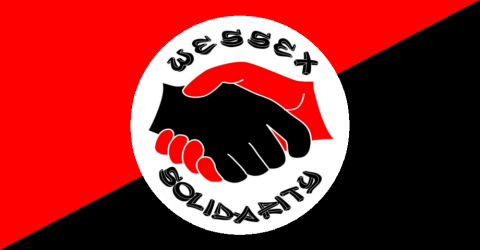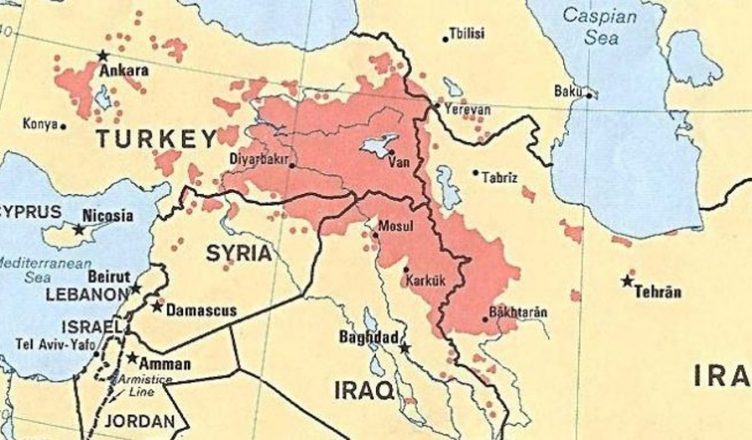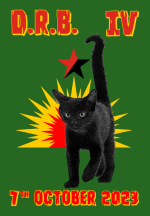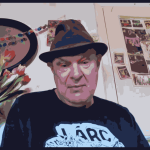Where were ‘stop the war’ when Afrin was being invaded?

The Anarchist Era Collective’s Statement on the Assassination of an Iranian State Terrorist
Anarchist Union of Afghanistan & Iran
 Qasem Soleimani has long tormented the people and we congratulate the survivors of his crimes in the Middle East, particularly Syria, Iraq and Yemen. And while we are glad for the death of this war criminal, we declare our strong opposition to the possibility of a state war (between US state terrorism and Iranian state terrorism)
Qasem Soleimani has long tormented the people and we congratulate the survivors of his crimes in the Middle East, particularly Syria, Iraq and Yemen. And while we are glad for the death of this war criminal, we declare our strong opposition to the possibility of a state war (between US state terrorism and Iranian state terrorism)
Hours ago, Qasem Soleimani, one of the top military officials of the Iranian government who was responsible for the Middle East, was killed on the direct order of Donald Trump in Baghdad
Qasem Soleimani was a genocidal man that has killed thousands of men, women, and children in the conflicts in Syria, Iraq and Yemen. He lead sieges for Assad and recruited Afghan refugees in Iran, many of them children, to die in the Syrian civil war. This state assassination was carried out by the United States in the obvious interest of Donald Trump’s election and what was done has not been and will not be in the interests of the people in the Middle East.
Despite much commotion and controversy made by the Islamic regime over its security and intelligence capabilities, we see that in fact this regime is not capable of maintaining its most important transnational force and Qasem Soleimani was assassinated as soon as the US decided to remove him.
On the one hand, the viciousness of the criminal Islamic regime became more apparent and on the other hand, it further showed the corrupt nature of US state terrorism, which does not care about the lives of their own nor those of the people in the Middle East—otherwise these Iranian state terrorists could have been easily hunted down over the years.
We reiterate that the contemporary Middle East is shaped by wars, massacres, displacement, and famine because of religious fanatics and terrorists on the one hand and the interference of international capitalists and backers (Eastern and Western Imperialism) on the other.
We hope all of these religious terrorists are killed as soon as possible and these murderous state governments will be destroyed so that the people of the Middle East live again in peace and prosperity.
Statement in support of the protests in Iran
In the past week or so, two statements about Iran have been circulated – one essentially supporting the Iranian regime by framing the whole issue as being about “US imperialism”, and another initiated by Iranian socialists and revolutionaries living in exile, which puts the movement in Iran into its proper context, as one more moment of our class fighting back, just as it is in Chile, Ecuador, Hong Kong, Haiti, France, Lebanon and so on. The latter is reproduced below. If you would like to add your name to the list of signatories, please send an email to azadi_subversion@riseup.net, stating your full name and affiliation/self-description.
We are protesting against problems in the whole system in general. We reached a crisis where we noticed that the system cannot handle it anymore
— a protester in Chile
Our world is on fire. Not only forests but also cities are burning all over the world. Social conflicts of all sorts are erupting, spreading their flames across the planet: Algeria, Chile, Ecuador, Haiti, Hong Kong, Iraq, Lebanon, Sudan, you name it. Located within this global context of struggles against the social hell of neoliberal, financialized capitalism, there has been another mass uprising in Iran since November 15, 2019.
Sparked by the sudden tripling of fuel prices, tens of thousands of Iranian people have been protesting in more than 100 cities throughout the country. Of course, the fuel price per se did not generate such a huge and widespread uprising. Rather, it is 40 years rule of the privileged oligarchy on the basis of authoritarianism, systematic exclusion of opponents, dispossession and expropriation which have made millions of people unemployed, extremely precarious, depriving them from the basic conditions of life (education, healthcare, food, and housing).
Just as 30 pesos increase in subway fares turned the already raging fire into an inferno in Chile, so too, the fuel price sparked the recent uprising in Iran (the same goes for WhatsApp tax in Lebanon, the cancellation of fuel subsidies in Ecuador, and so on). “It is not about 30 pesos”, a Chilean poster proclaimed, “but 30 years of neoliberalism.”
Since Friday, the people in Iran have been courageously fighting against the heavily armed personnel of the regime’s Islamic Revolutionary Guards Corps (IRGC), as well as armed plainclothes militia thugs (known as Basij) who are economically dependent on the regime. The people had every “right” in this world to defend themselves against the systematic state-violence, build barricades on the streets, block highways and occupy local areas and roundabouts.
The forgotten and the invisible in Iran made themselves visible by starting fires. The fire to these people is the yellow vest to the French surplus population and proletarians. Both give voice to the voiceless. While the BBC Persian TV and reactionary loyalist media (Iran International, Manoto etc.) prescribe the liberal doctrine of “peaceful, civil protest,” the Iranian youth are self-conscious of the fact that “a people without hate cannot triumph,” that “material force must be overthrown by material force,” and that they have the right to legitimately defend themselves against the state violence systematically aimed at killing the citizens.
“Enough is enough” is the message of the people in the Global South and beyond. As students have chanted in one of Tehran’s universities, “the people are fed up, enough with slavery.” Like our sisters and brothers in Iraq and Lebanon, the Iranian people are absolutely fed up with the authoritarian capitalism reducing their lives to a mere vegetable existence, the systematic corruption intrinsic to mafia capitalism, and the sub-imperialism of the Islamic Republic in Iraq, Lebanon, Palestine, Syria, Yemen and the region as a whole.
They are not only opposing the tripling of the fuel price but the Islamic Republic in its entirety. No other slogan, chanted by our comrades in Lebanon, can better express the spirit of struggles in the current conjuncture: “All means all” (كلن يعني كلن).
The ruling class has responded to this radical, practical negation of all existing powers with an iron fist. The systematic violence employed by the Islamic Republic to paralyze the uprising is unprecedented in scale and intensity. The authorities have completely shut down the internet for four successive days, transforming the country into a big black box, slaughtering the people with impunity. According to Amnesty International, hundreds have been injured, thousands arrested, and “at least 106 protesters in 21 cities have been killed,” although “the real death toll may be much higher, with some reports suggesting as many as 200.”
There are many videos showing the police shooting demonstrators in the head and chest — as we observed before in the case of Iraq. This happened mainly in the Kurdish and Arab provinces whose discriminated people are once again at the very forefront of the uprising and have paid the highest price.
The Islamic Republic has been successful so far in achieving its goals. They have seized the opportunity provided by the US sanctions to realize their neoliberal dreams in order to be able to both recover the current budget deficit and increase their military operations in the region. To do so, they have shut down the internet by virtue of which they have brutally slaughtered their opponents. Internationally speaking, there has been no specific media coverage, no international condemnation of the state repression, and very little solidarity from the global left — in other words, the bloodbath is carried out in silence. This is possible because, while the oppressed classes in Iran and the Middle East have no illusion about the “anti-imperialist” role of the Islamic Republic, many on the left still believe in the ideological self-representation of the regime as an anti-imperialist force standing against the US and its regional allies.
The left needs to learn from the oppressed classes to simultaneously oppose US imperialism (especially US sanctions) and the Islamic Republic’s interventions in the region.
We, the undersigned academics and militants, urge the global left to break its silence and express its solidarity with the people of Iran and their resistance.
It is pointless for us to demand anything from the Islamic Republic, but we will demand from our comrades and progressive forces all over the world to be — in any possible form — the voice of the oppressed people in Iran suffocated by the forced isolation. We also call on the international left to condemn the atrocities of the regime against its own people.
Finally, we stand in solidarity with the Iranian protesters who are reclaiming their dignity by refusing austerity, authoritarianism, militarization of society, as well as any other form of domination that stifles their autonomy and freedom.
No Friends But The Mountains
The Kurds have entered into alliances with local States and imperialist powers, always to be betrayed. After World War One, they were promised their own state by the victorious imperialist forces of Britain, France and the USA. These promises, enshrined in the Treaty of Sevres in 1920, proved to be worthless, and anyway it was always about how the great powers would carve up the old Ottoman Empire.
The Kurdistan depicted in the Treaty of Sevres would have been under British control. Some Kurdish nationalists supported this, but others sided with the Turkish nationalist military leader Kemal Ataturk to fight the Allied powers. These Muslim Kurds preferred Ottoman or Turkish nationalist control to domination by a Christian power. Others feared that the British would re-introduce Armenians – who had fled after the genocidal attacks on them by the Turks – would be re-introduced to the region. This was a decision to be regretted by the Kurds as they experienced the reality of life under the Ataturk regime.
The British had occupied the oil-rich province of Mosul, where many Kurds lived, in 1918. The following year Mosul was incorporated into the newly created Iraq. The Treaty of Sevres promised the Iraqi Kurds the chance to be part of this projected Kurdistan, a promise never to be fulfilled.
In 1920 Shaykh Mahmud Barzanji led an uprising of the Iraqi Kurds against British rule and declared a Kurdish kingdom in northern Iraq. At first the British had backed Barzanji, who they saw as offering a convenient buffer territory between their interests in Iraq and the Turkish state. He had become increasingly resentful about the failure of the British to keep their promises. He was wounded, captured and imprisoned in India until 1922.
However, the British now decided to bring him back to stabilise the area against the Turkish nationalists and he was installed as governor of south Kurdistan, but after his return he proclaimed himself King of Kurdistan, turned down the British deal and allied with Turkey. Barzanji was defeated and captured again in 1932. He sued for peace and was exiled to southern Iraq. During the series of uprisings against the British, the RAF used bombs and chemical weapons against Kurdish insurgents.
In 1968 the USA supported the coming to power in Iraq of the Ba’athist Party, which promptly began to attack the Kurds in that country. In the 1970s it supported the Shah of Iran as its ally in the region, and gave support to the Kurds against Iraq. When war between Iran and Saddam Hussein’s Iraq ended suddenly in 1975, Iran dropped its Kurdish allies and the Americans stopped supplying them with military aid. The Kurds then were at the mercy of Saddam.
In the 1980s The USA saw Saddam as a useful regional ally, particularly with the fall of the Shah and the Islamic Revolution in 1979 in Iran. The Americans turned a blind eye to Saddam’s atrocities against the Kurds. This changed again in 1990 with Saddam’s invasion of Kuwait. He was now the enemy of the USA and American support was given to Kurdish and Shiite revolts in Iraq. However with the declaration of a Kurdish autonomous zone in northern Iraq, the USA failed to provide assistance and the revolt was crushed.
With the Syrian civil war, the Kurdistan Workers Party (PKK) of Turkey, who had been waging a war against the Turkish State, in alliance with its proxy, the Democratic Union Party (PYD) took over parts of Syria from the Assad regime. They defended themselves against attacks from the Islamic State. The Americans, seeking an ally in the region, at first supported the Kurds against ISIS with air attacks, and then later with financial and military aid. The Kurds had once again become a proxy of the USA.
All of this changed with Trump’s abrupt decision to desert the Kurds and to allow the Turkish state to attack the Kurdish area in Syria. But, once again, Trump has reversed his position of pulling US troops out of Syria, under pressure from both Democrats and Republicans, and the criticisms of many retired military leaders. What this means for the Kurds in Syria remains to be seen.
As for Russia, it initially gave support to the PYD and its military units, the YPG. Now, however, Russia’s uneasy alliance with the Erdogan regime in Turkey means that Putin has given the green light for YPG forces to be pushed back from the Turkish/Syrian border. Putin met with Erdogan at the Black Sea resort of Sochi last week, and there it was agreed that Russian troops in Syria would not intervene to stop the advance of the Turkish forces. For its part, the PYD has agreed for the return of control of north east Syria to Assad and his forces. The PYD might switch allegiances and go into alliance with Russia, which will cynically play them off against the Turkish State, and then in time-honoured fashion, drop the Kurds when they are no longer deemed useful. Putin’s support of the Assad regime is still a priority and comes before any support for the Kurds.
We should also be aware of the demands by the German Defence Minister, Annegret Kramp-Karrenbauer to set up a security zone in the area and send thousands of troops there. This represents a move by the Franco-German bloc in Europe to intervene for its own interests.
Meanwhile, across the border in northern Iraq, the USA still supports the Kurdish autonomous region ruled by the Barzani family. However, this support has its limits. After an independence referendum with a 93% vote of Yes, in 2017, the USA used its troops to support Iraqi forces to push the Kurds back into their enclave and the areas taken by the Kurds in 2014, including Kirkuk and its oilfields, were retaken by the Iraqi government. This is in spite of the role that Kurdish forces had played in driving out ISIS from most of Iraq.
There is an old Kurdish saying that the Kurds have no friends but the mountains. Any attempt by the Kurds to ally with world imperialist powers as well as regional imperialist powers like Iran, have proven time and again to be disastrous. The Kurds are used as proxies, as cannon fodder for the interests of these powers in a danger zone where the USA and its British and European allies, and Russia and its allies of Syria and Iran, are in confrontation.
Only a revolutionary movement that unites Kurdish, Turkish, and Arab workers and sweeps away the ruling class in the Middle East, whether it be the Barzani family, the theocratic regime in Iran, the Assad regime in Syria and Erdogan in Turkey, can offer any real solution to the situation.
Interview with a member of the Union of Anarchists of Iran and Afghanistan
Aotearoa Workers Solidarity Movement
 We are used to seeing anarchism as a purely Western phenomenon. Rebellions, riots and uprisings further east are more associated with Islamists than anti-authoritarian ideas. All this generates a number of stereotypes about the inhabitants of these regions. However, it turns out that groups of anarchists exist even where American bombs fall and that people are executed for Facebook posts. Pramen interviewed the Union of Anarchists of Iran and Afghanistan.
We are used to seeing anarchism as a purely Western phenomenon. Rebellions, riots and uprisings further east are more associated with Islamists than anti-authoritarian ideas. All this generates a number of stereotypes about the inhabitants of these regions. However, it turns out that groups of anarchists exist even where American bombs fall and that people are executed for Facebook posts. Pramen interviewed the Union of Anarchists of Iran and Afghanistan.
Your group is called the Union of Anarchists of Iran and Afghanistan. What motivated you to join forces in both countries? Geographic proximity ? No language barrier? Transparency of borders? Common history?
Since anarchism leads to positions against borders and states, in the case of Iran and Afghanistan, it is important to remember that these are only names, the names of two regions. We do not justify the existence of borders and states, and we want our revolutionary demands to be universal and not related to any particular area. In general, the main reason is that comrades speak the same language and cooperate within both regions.
Good migrant/Bad migrant? By Mal Content.
That loyal mouthpiece of the establishment the BBC has taken to calling the migrant populations languishing in camps and at border posts “refugees and economic migrants”. In any halfway sympathetic pronouncement from the beleaguered political class, all complicit in smashing the infrastructure of five countries, the word refugee is usually prefaced with genuine. Somewhere in the fevered popular imagination lurks the spectre of the economic migrant, a worker from a less affluent country prepared to risk life and limb to reach the UK so they can drive a minicab or deliver pizza, or worse still, eke out a meagre living under the D.W.P.’s brutal benefits regime, or perhaps wait years for an operation on the NHS. Just how desperate would you have to be? Poverty is the worst form of violence, Ghandi once claimed, though I doubt he was the first to articulate that simple truth. Why then is it so despicable to flee this particular form? Swerve bullets and bombs all you like but hunger and disease must simply be endured. The reason is obvious, how else could you accept an economic regime that has a mere eighty individuals, sitting like a boil on the arse of humanity, wielding the same purchasing power as the poorest three and a half billion?
Never mind that if all British citizens living overseas returned, and all non-Britons left, there would be 1.3 million more people on the island, and we would have traded productive workers for retired bankers and bent car dealers. We learn nothing by evaluating these matters in terms of capitalist economics. There is no shortage of anything here, with a million empty homes and fifteen million tons of food thrown away annually. If the borders were torn down and resources allocated according to need, it would just show the politicians have been talking bollocks all along. Pidgin economics are a smokescreen for racism, on which the ruling class relies as much as it ever did to keep us in our separate little boxes. Working class radicals have no use for borders; we recognise they serve only the bosses, maintaining differentials in prices and wages that allow them to increase their mark-up.
So how’s this for economic migration? In 2002, capitalist James Dyson laid off five hundred and sixty workers in Wiltshire and moved his vacuum cleaner factory to Malaysia where he can hire people for £3 per hour. Well if we all work for that rate who’s going to buy his fucking vacuum cleaners at 300 quid a pop? Dyson had free school milk, free healthcare and a grant to further education, all provided by the working class. Developing the product, he was supported by his wife’s salary as an art teacher – try doing that in Malaysia! No liberal economist would oppose the free movement of capital, but if you decline to work for three quid an hour and move from Malaysia to Wiltshire expect to be pilloried for it. The economist knows that globalisation of capital requires globalisation of labour, but the bourgeoisie does not want free movement of labour; they must be able to control it through their tame politicians. Super-exploited groups are used to drive down wages and conditions at the bottom. As a bonus, this creates resentment and division in our class, diverting the blame for economic hardship away from the bosses. So-called ‘quality immigration’ of skilled personnel is nothing but a shameless pillage of the education systems of the poorest countries. The I.T. engineer from Mumbai and the doctor from Manila owe their expertise to the working class of those communities, without whom they would never have reached adulthood, let alone qualified.
“They’re taking our jobs” well they’re fucking welcome to mine; I’d gladly share it with them and have more time for something universally beneficial. Cash-rich corporations are reluctant to employ anyone in the dwindling range of increasingly futile tasks unless they will work for JSA or come heavily subsidised by the taxpayer. It’s hardly surprising; technology makes production ever less labour-intensive so profits – which only come from unpaid labour – fall. As the cost of living, especially accommodation, rises, so does the cost of maintaining the labouring capacity of the worker, and only once this cost has been met, by the capitalist or the state, does the remaining portion of their working day generate profit for the capitalist. So the bourgeoisie are happier investing their ill-gotten in something like Trident, that doesn’t have to compete in the marketplace. The decision to purchase will be made by wealthy politicians and the cost will be borne by taxpayers, the overwhelming bulk of whom will be working class. Any new technology developed on its budget will belong to the corporations, protected by patents. The politicians will subsequently take on directorships. Is it merely coincidence that the first public admission of the use of a British drone for extra-judicial execution coincides with the opening of the biennial DSEI arms fair in London?
Western capitalism was founded on primitive accumulation, the economist’s euphemism for armed robbery: the pillage of Latin America and the Indian sub-continent, the enclosure of indigenous lands, the transatlantic slave trade and a bit of opium-running. For four hundred years, the British Empire did precisely what Islamic state/daesh is doing now, only without the internet. Its state terrorism only ceased when its colonies achieved independence. During the 1950’s Britain maintained its rule in Kenya with concentration camps, summary execution, rape, torture and mutilation.
The Middle Eastern insurgent movements of my youth were aggressively secular and vaguely Marxist-Leninist in character. ‘Political Islam’ in its mediaevalist Wahabi form, was a tiny insignificant sect. This changed with the Russian invasion of Afghanistan; the fundamentalists were cultivated, both by Western capitalism, and its proxy, the Saudi ruling dynasty, who feared the loss of their privileged position as feudal proprietors. On the other hand, Baathist Iraq, in all its secular post-Stalinist despotism, was equally courted to oppose the regime in Iran that emerged from the popular revolution against the one the West installed to replace Mohammad Mosaddeq after he nationalised Anglo-Iranian oil (now BP). Iraq had a million men under arms at the end of that war, the fifth largest standing army in the world. Following the Western invasion they were given a month’s pay and sent home. That, plus Iraqi Sunnis interned during the occupation is now daesh in Syria. In 1930’s Spain a similar totalitarian theocracy was born when British duplicity and incompetence allowed General Franco to opportunistically unite his reactionary officer corps with the fascist Falange party, religious fanatics, greedy landowners and a venal clergy.
Why all the history? Because it’s still being made! These fools brought chaos to the Middle East and terrorism to New York and London; they will deliver us World War Three if we let them.
Nevertheless the politicians have been left in the dust by the popular reaction to events. Without waiting to be asked, working class people have organised to gather and deliver aid to the camps or drive refugees illegally into Europe. Some of the most intrepid have volunteered for the militia of autonomous Rojava at the front line against daesh and their Turkish ally. Back home in our towns and villages, we attack thieving bosses and slum landlords, resist gentrification and austerity, foil workfare, eviction and deportation, and one by one, hound the fascists from our community. Our deeply divided society is steaming purposefully in two opposite directions; the one towards a life based on mutual aid and solidarity; the other perpetuating selfishness, greed, commodity fetishism and alienated wage labour. When the two meet again it will be for a fight to the finish. It’s time to choose your future and pick your side.
Debunking ‘old Labour’
Download as A5 pamphlet prints: size, double sided, B&W. Text retrieved from a scanned copy of the original 1960 SWF edition, which can be viewed here:
Action Man: Battlefield Casualties
A Veterans For Peace UK Film challenging the British Army’s policy of recruiting 16 year olds into the most dangerous army jobs. More details at: www.battlefieldcasualties.co.uk
STATELESS DEMOCRACY: HOW THE KURDISH WOMEN’S MOVEMENT LIBERATED DEMOCRACY FROM THE STATE
Dilar Dirik is an activist of the Kurdish Women’s Movement and a PhD candidate in the Sociology Department of the University of Cambridge. Below is her lecture at the 4th New World Summit entitled “Stateless Democracy: How the Kurdish Women’s Movement Liberated Democracy from the State.” Re-blogged from Kurdish Question











